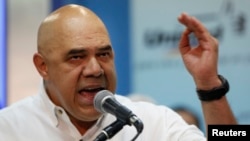Venezuela's opposition parties on Wednesday named a 56-year-old journalist and teacher to head their coalition ahead of 2015 parliamentary elections where they hope to weaken President Nicolas Maduro's socialist government.
"It was a unanimous decision to elect me, we're all rowing in the same direction," Jesus Torrealba said in a speech accepting leadership of an opposition movement that narrowly lost the presidency to Maduro last year and has been squabbling since.
He replaces outgoing Democratic Unity coalition executive-secretary Ramon Guillermo Aveledo, who resigned in July, and faces a mammoth task to unite moderates and radicals who differ in their views on how to oppose Maduro.
Torrealba, who was a member of the Communist Party in his youth, founded a non-governmental organization called "Neighborhoods' Radar" and later had a program of the same name on a pro-opposition TV station to denounce grassroots problems from potholes to burst pipes.
In a nod to government accusations that Venezuela's opposition leaders represent a rich elite out of touch with the masses, Torrealba said an outdoor rally would be held on Oct. 4 to begin a campaign of public mobilizations.
"We're going to build a better world and take on this regime," he added to representatives of 27 opposition parties. "We're building a new pact between the political leadership and the poor."
Venezuela's opposition parties suffered from chronic in-fighting during a decade of the late President Hugo Chavez's 1999-2013 rule, enabling him to outwit them over-and-over at elections.
But, with Aveledo as the intellectual architect, they came together in the Democratic Unity coalition (MUD) for a 2009 legislative vote. Young governor Henrique Capriles fought - and lost - two presidential elections on their behalf.
First, Capriles lost to Chavez in 2012, though he got the highest opposition vote share yet in a plethora of national votes under Chavez. Then he narrowly lost to Maduro in 2013.
After that, opposition ranks split again, with hardline activists turning on Capriles and Aveledo for not taking a more militant line against alleged vote fraud in 2013 and during anti-government protests this year. Forty-three people died in the protests which marked the worst political violence in Venezuela for years.
As well as another parliamentary vote at the end of 2015, the opposition has a chance to force a recall referendum half-way through Maduro's six-year term - which would be in 2016 - if they garner about four million signatures requesting that.
Maduro's popularity rating has slipped to about 35 percent, according to pollster Datanalisis' latest figure for July, largely due to economic problems like shortages and high inflation. But the opposition is faring no better in Venezuelans' eyes, polls show.





